Business Law - Assignment PDF
VerifiedAdded on 2021/12/08
|8
|1703
|70
AI Summary
Contribute Materials
Your contribution can guide someone’s learning journey. Share your
documents today.
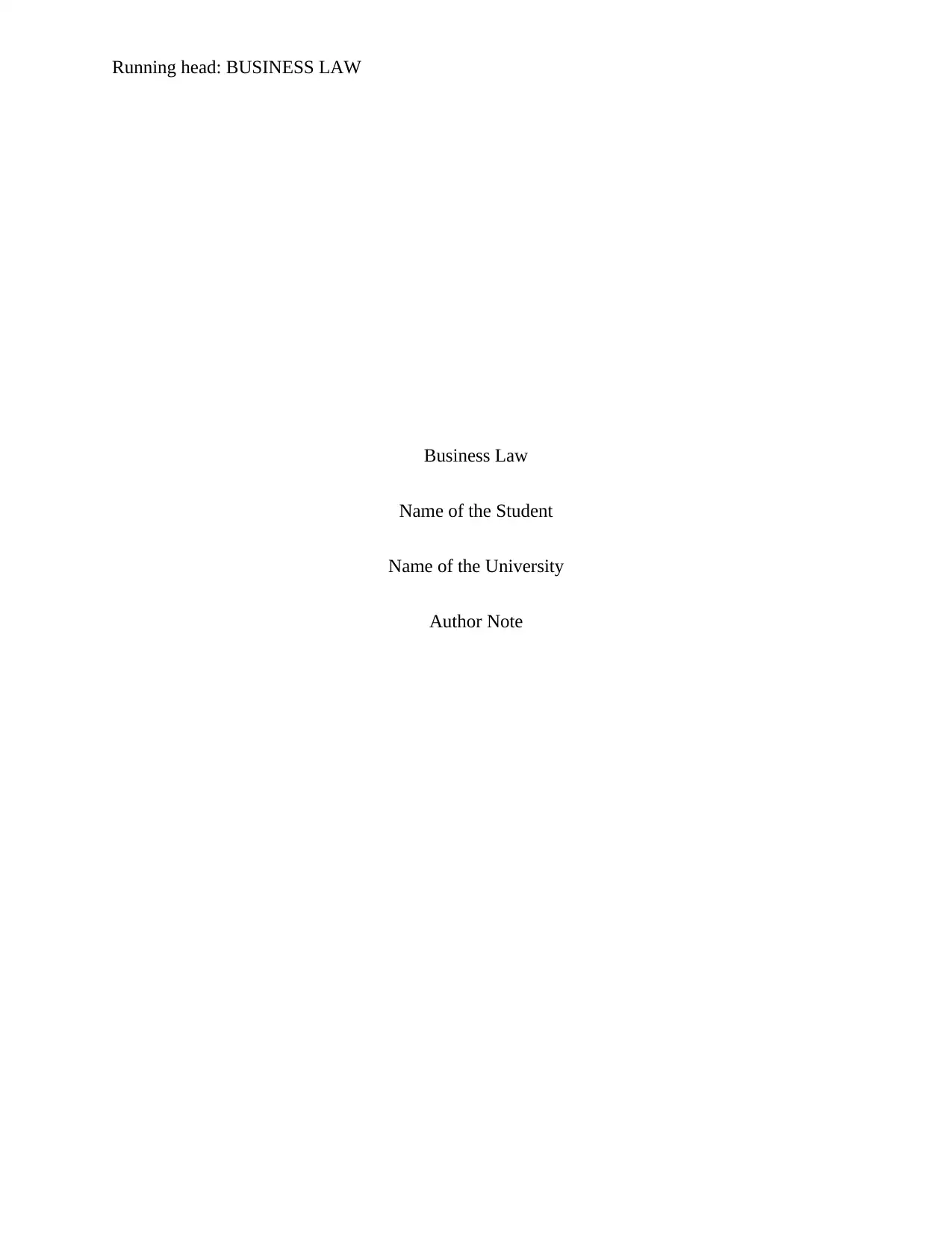
Running head: BUSINESS LAW
Business Law
Name of the Student
Name of the University
Author Note
Business Law
Name of the Student
Name of the University
Author Note
Secure Best Marks with AI Grader
Need help grading? Try our AI Grader for instant feedback on your assignments.
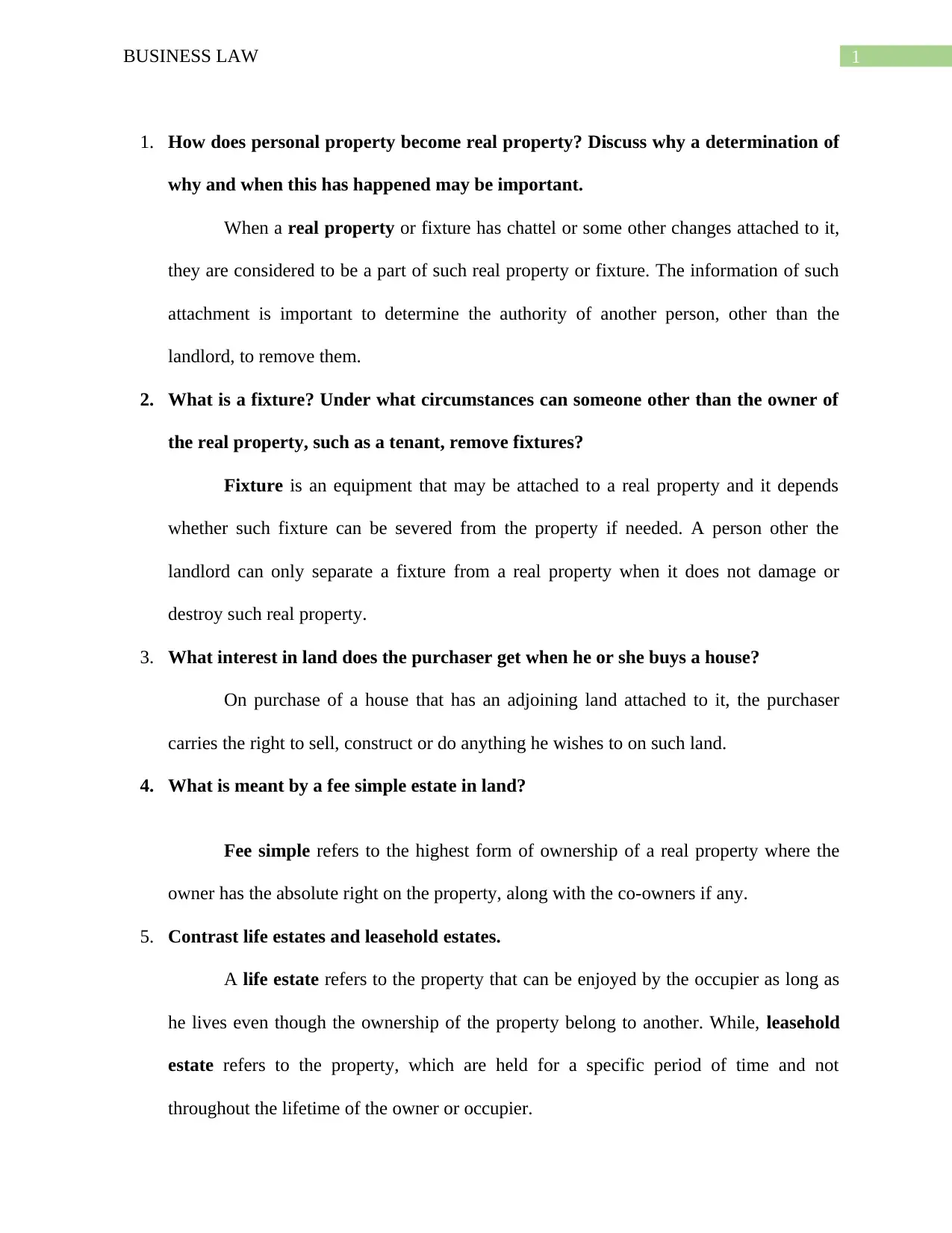
1BUSINESS LAW
1. How does personal property become real property? Discuss why a determination of
why and when this has happened may be important.
When a real property or fixture has chattel or some other changes attached to it,
they are considered to be a part of such real property or fixture. The information of such
attachment is important to determine the authority of another person, other than the
landlord, to remove them.
2. What is a fixture? Under what circumstances can someone other than the owner of
the real property, such as a tenant, remove fixtures?
Fixture is an equipment that may be attached to a real property and it depends
whether such fixture can be severed from the property if needed. A person other the
landlord can only separate a fixture from a real property when it does not damage or
destroy such real property.
3. What interest in land does the purchaser get when he or she buys a house?
On purchase of a house that has an adjoining land attached to it, the purchaser
carries the right to sell, construct or do anything he wishes to on such land.
4. What is meant by a fee simple estate in land?
Fee simple refers to the highest form of ownership of a real property where the
owner has the absolute right on the property, along with the co-owners if any.
5. Contrast life estates and leasehold estates.
A life estate refers to the property that can be enjoyed by the occupier as long as
he lives even though the ownership of the property belong to another. While, leasehold
estate refers to the property, which are held for a specific period of time and not
throughout the lifetime of the owner or occupier.
1. How does personal property become real property? Discuss why a determination of
why and when this has happened may be important.
When a real property or fixture has chattel or some other changes attached to it,
they are considered to be a part of such real property or fixture. The information of such
attachment is important to determine the authority of another person, other than the
landlord, to remove them.
2. What is a fixture? Under what circumstances can someone other than the owner of
the real property, such as a tenant, remove fixtures?
Fixture is an equipment that may be attached to a real property and it depends
whether such fixture can be severed from the property if needed. A person other the
landlord can only separate a fixture from a real property when it does not damage or
destroy such real property.
3. What interest in land does the purchaser get when he or she buys a house?
On purchase of a house that has an adjoining land attached to it, the purchaser
carries the right to sell, construct or do anything he wishes to on such land.
4. What is meant by a fee simple estate in land?
Fee simple refers to the highest form of ownership of a real property where the
owner has the absolute right on the property, along with the co-owners if any.
5. Contrast life estates and leasehold estates.
A life estate refers to the property that can be enjoyed by the occupier as long as
he lives even though the ownership of the property belong to another. While, leasehold
estate refers to the property, which are held for a specific period of time and not
throughout the lifetime of the owner or occupier.
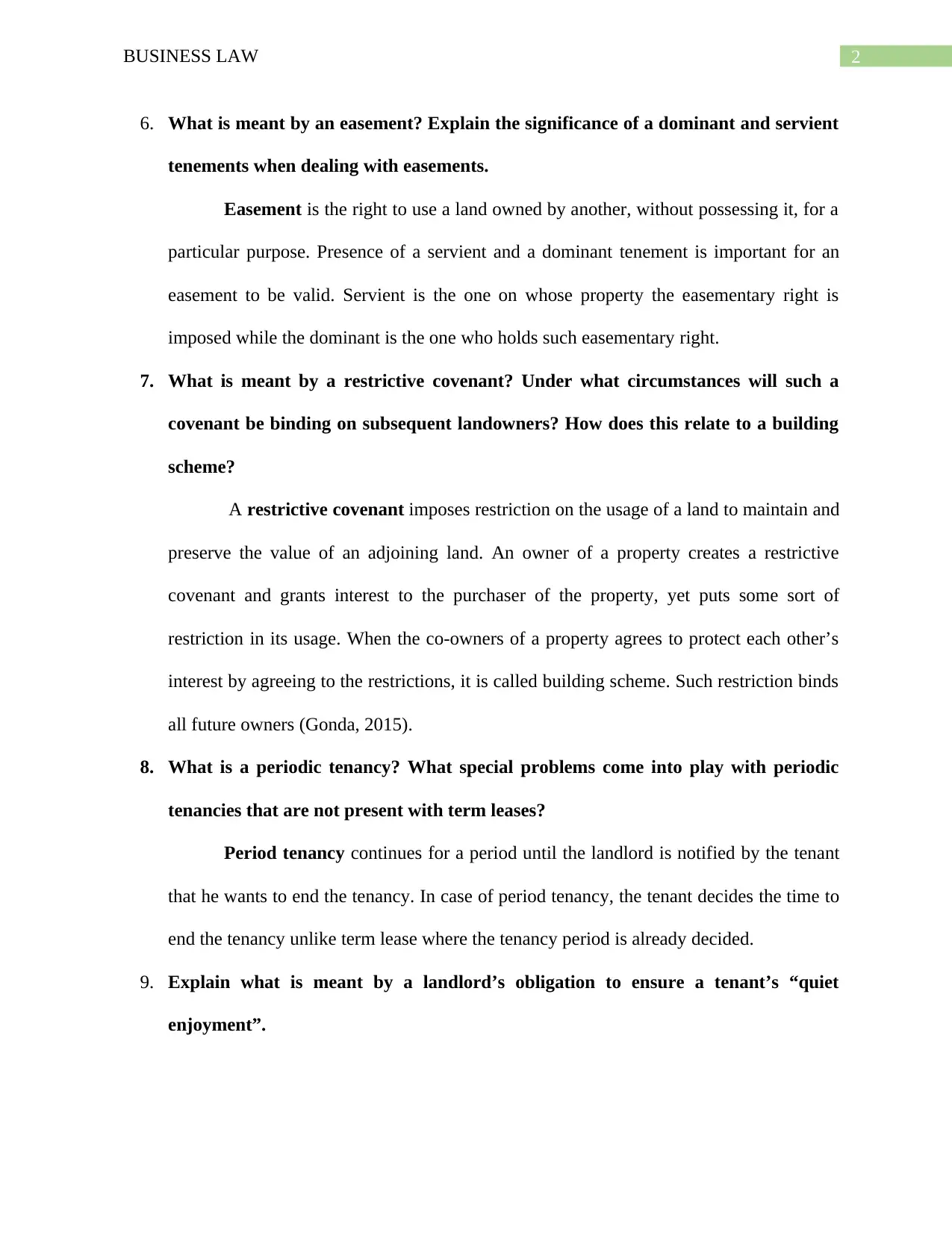
2BUSINESS LAW
6. What is meant by an easement? Explain the significance of a dominant and servient
tenements when dealing with easements.
Easement is the right to use a land owned by another, without possessing it, for a
particular purpose. Presence of a servient and a dominant tenement is important for an
easement to be valid. Servient is the one on whose property the easementary right is
imposed while the dominant is the one who holds such easementary right.
7. What is meant by a restrictive covenant? Under what circumstances will such a
covenant be binding on subsequent landowners? How does this relate to a building
scheme?
A restrictive covenant imposes restriction on the usage of a land to maintain and
preserve the value of an adjoining land. An owner of a property creates a restrictive
covenant and grants interest to the purchaser of the property, yet puts some sort of
restriction in its usage. When the co-owners of a property agrees to protect each other’s
interest by agreeing to the restrictions, it is called building scheme. Such restriction binds
all future owners (Gonda, 2015).
8. What is a periodic tenancy? What special problems come into play with periodic
tenancies that are not present with term leases?
Period tenancy continues for a period until the landlord is notified by the tenant
that he wants to end the tenancy. In case of period tenancy, the tenant decides the time to
end the tenancy unlike term lease where the tenancy period is already decided.
9. Explain what is meant by a landlord’s obligation to ensure a tenant’s “quiet
enjoyment”.
6. What is meant by an easement? Explain the significance of a dominant and servient
tenements when dealing with easements.
Easement is the right to use a land owned by another, without possessing it, for a
particular purpose. Presence of a servient and a dominant tenement is important for an
easement to be valid. Servient is the one on whose property the easementary right is
imposed while the dominant is the one who holds such easementary right.
7. What is meant by a restrictive covenant? Under what circumstances will such a
covenant be binding on subsequent landowners? How does this relate to a building
scheme?
A restrictive covenant imposes restriction on the usage of a land to maintain and
preserve the value of an adjoining land. An owner of a property creates a restrictive
covenant and grants interest to the purchaser of the property, yet puts some sort of
restriction in its usage. When the co-owners of a property agrees to protect each other’s
interest by agreeing to the restrictions, it is called building scheme. Such restriction binds
all future owners (Gonda, 2015).
8. What is a periodic tenancy? What special problems come into play with periodic
tenancies that are not present with term leases?
Period tenancy continues for a period until the landlord is notified by the tenant
that he wants to end the tenancy. In case of period tenancy, the tenant decides the time to
end the tenancy unlike term lease where the tenancy period is already decided.
9. Explain what is meant by a landlord’s obligation to ensure a tenant’s “quiet
enjoyment”.
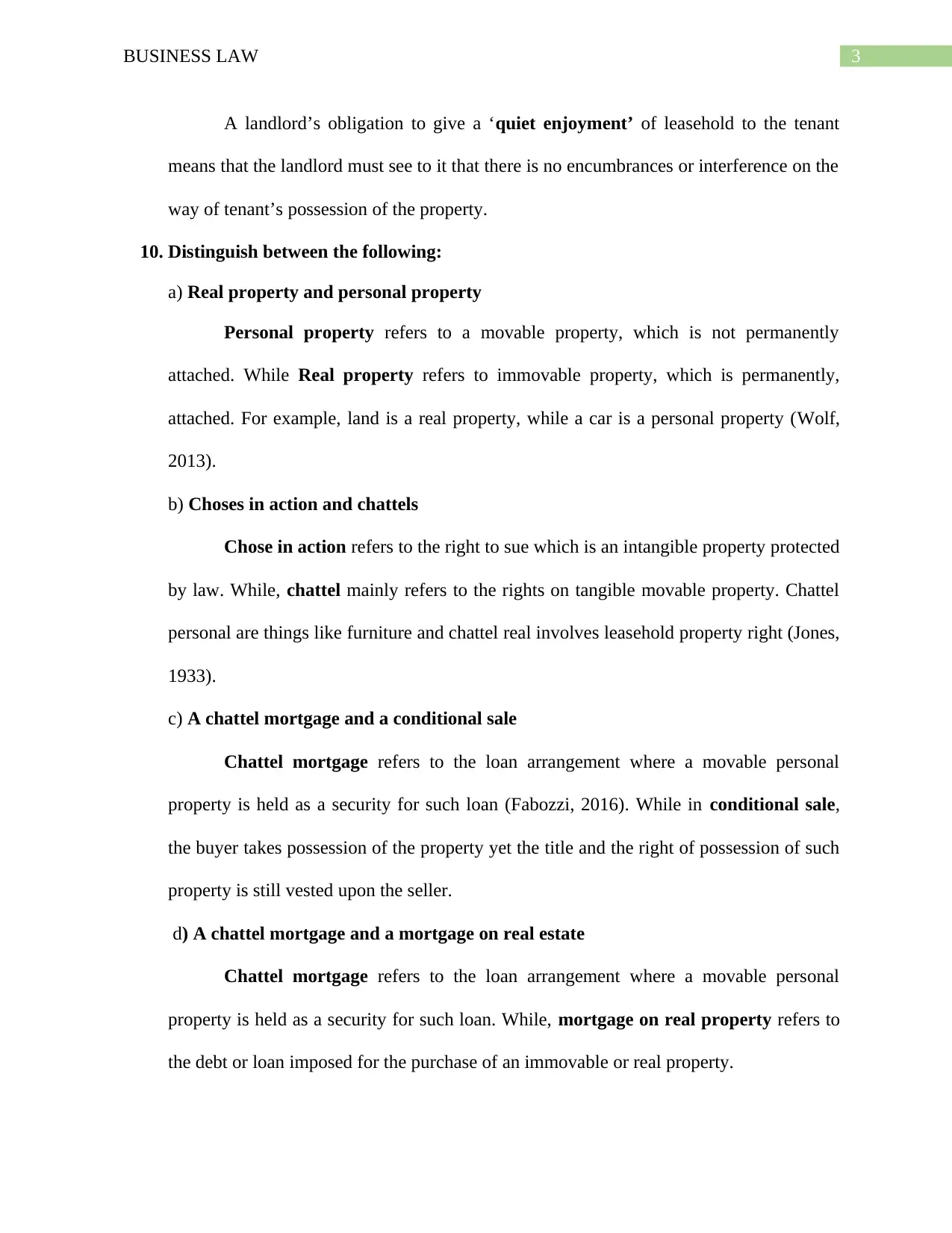
3BUSINESS LAW
A landlord’s obligation to give a ‘quiet enjoyment’ of leasehold to the tenant
means that the landlord must see to it that there is no encumbrances or interference on the
way of tenant’s possession of the property.
10. Distinguish between the following:
a) Real property and personal property
Personal property refers to a movable property, which is not permanently
attached. While Real property refers to immovable property, which is permanently,
attached. For example, land is a real property, while a car is a personal property (Wolf,
2013).
b) Choses in action and chattels
Chose in action refers to the right to sue which is an intangible property protected
by law. While, chattel mainly refers to the rights on tangible movable property. Chattel
personal are things like furniture and chattel real involves leasehold property right (Jones,
1933).
c) A chattel mortgage and a conditional sale
Chattel mortgage refers to the loan arrangement where a movable personal
property is held as a security for such loan (Fabozzi, 2016). While in conditional sale,
the buyer takes possession of the property yet the title and the right of possession of such
property is still vested upon the seller.
d) A chattel mortgage and a mortgage on real estate
Chattel mortgage refers to the loan arrangement where a movable personal
property is held as a security for such loan. While, mortgage on real property refers to
the debt or loan imposed for the purchase of an immovable or real property.
A landlord’s obligation to give a ‘quiet enjoyment’ of leasehold to the tenant
means that the landlord must see to it that there is no encumbrances or interference on the
way of tenant’s possession of the property.
10. Distinguish between the following:
a) Real property and personal property
Personal property refers to a movable property, which is not permanently
attached. While Real property refers to immovable property, which is permanently,
attached. For example, land is a real property, while a car is a personal property (Wolf,
2013).
b) Choses in action and chattels
Chose in action refers to the right to sue which is an intangible property protected
by law. While, chattel mainly refers to the rights on tangible movable property. Chattel
personal are things like furniture and chattel real involves leasehold property right (Jones,
1933).
c) A chattel mortgage and a conditional sale
Chattel mortgage refers to the loan arrangement where a movable personal
property is held as a security for such loan (Fabozzi, 2016). While in conditional sale,
the buyer takes possession of the property yet the title and the right of possession of such
property is still vested upon the seller.
d) A chattel mortgage and a mortgage on real estate
Chattel mortgage refers to the loan arrangement where a movable personal
property is held as a security for such loan. While, mortgage on real property refers to
the debt or loan imposed for the purchase of an immovable or real property.
Secure Best Marks with AI Grader
Need help grading? Try our AI Grader for instant feedback on your assignments.
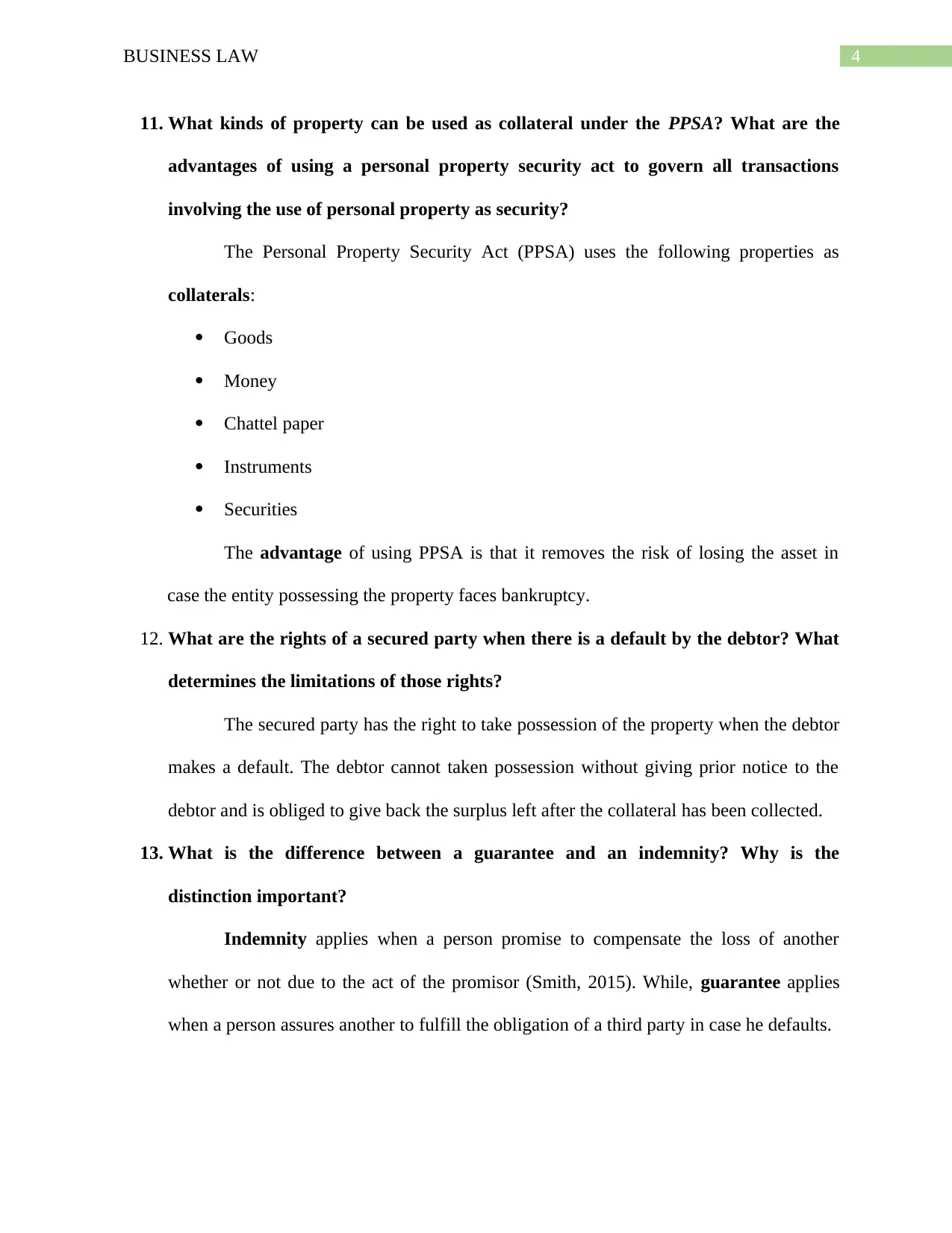
4BUSINESS LAW
11. What kinds of property can be used as collateral under the PPSA? What are the
advantages of using a personal property security act to govern all transactions
involving the use of personal property as security?
The Personal Property Security Act (PPSA) uses the following properties as
collaterals:
Goods
Money
Chattel paper
Instruments
Securities
The advantage of using PPSA is that it removes the risk of losing the asset in
case the entity possessing the property faces bankruptcy.
12. What are the rights of a secured party when there is a default by the debtor? What
determines the limitations of those rights?
The secured party has the right to take possession of the property when the debtor
makes a default. The debtor cannot taken possession without giving prior notice to the
debtor and is obliged to give back the surplus left after the collateral has been collected.
13. What is the difference between a guarantee and an indemnity? Why is the
distinction important?
Indemnity applies when a person promise to compensate the loss of another
whether or not due to the act of the promisor (Smith, 2015). While, guarantee applies
when a person assures another to fulfill the obligation of a third party in case he defaults.
11. What kinds of property can be used as collateral under the PPSA? What are the
advantages of using a personal property security act to govern all transactions
involving the use of personal property as security?
The Personal Property Security Act (PPSA) uses the following properties as
collaterals:
Goods
Money
Chattel paper
Instruments
Securities
The advantage of using PPSA is that it removes the risk of losing the asset in
case the entity possessing the property faces bankruptcy.
12. What are the rights of a secured party when there is a default by the debtor? What
determines the limitations of those rights?
The secured party has the right to take possession of the property when the debtor
makes a default. The debtor cannot taken possession without giving prior notice to the
debtor and is obliged to give back the surplus left after the collateral has been collected.
13. What is the difference between a guarantee and an indemnity? Why is the
distinction important?
Indemnity applies when a person promise to compensate the loss of another
whether or not due to the act of the promisor (Smith, 2015). While, guarantee applies
when a person assures another to fulfill the obligation of a third party in case he defaults.
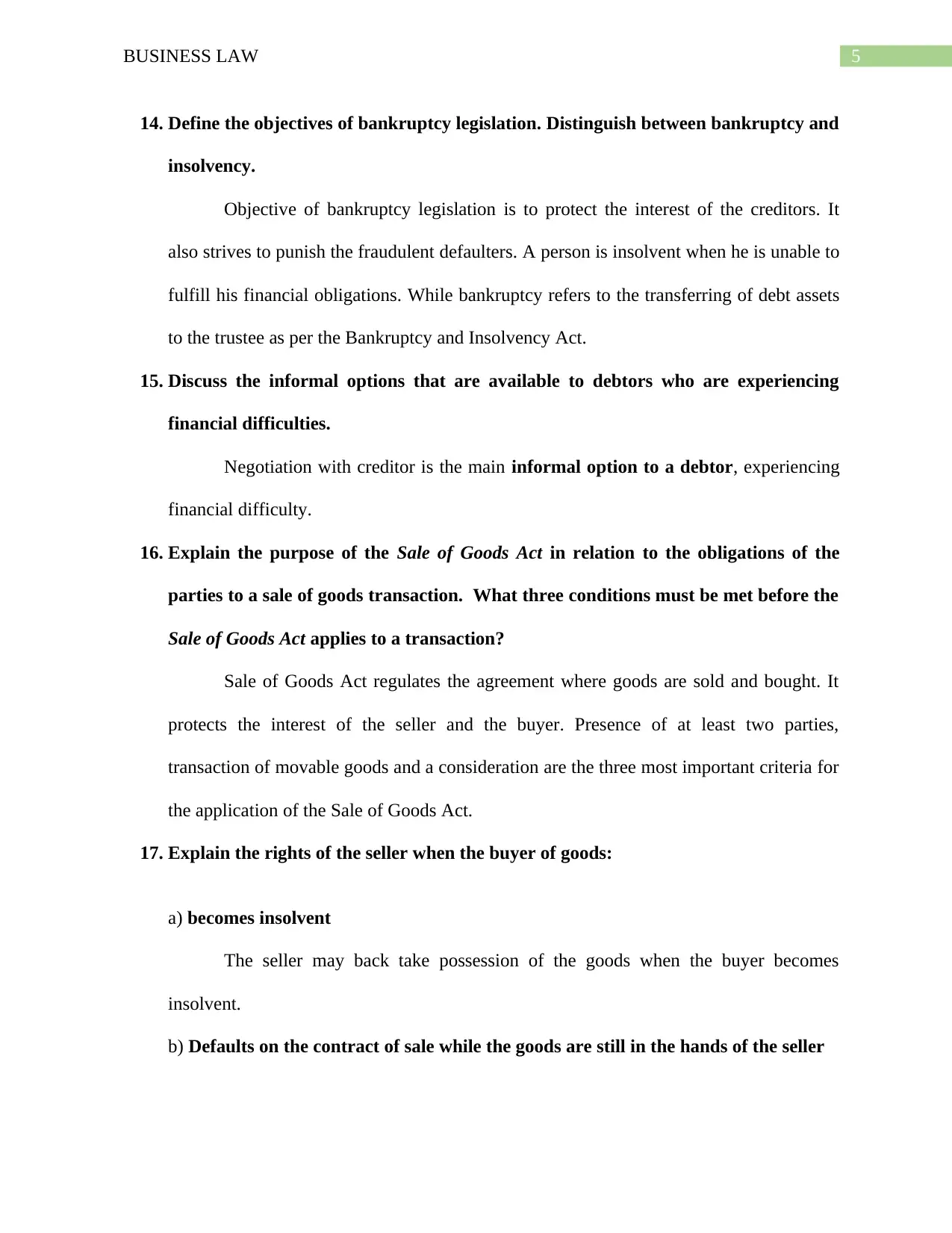
5BUSINESS LAW
14. Define the objectives of bankruptcy legislation. Distinguish between bankruptcy and
insolvency.
Objective of bankruptcy legislation is to protect the interest of the creditors. It
also strives to punish the fraudulent defaulters. A person is insolvent when he is unable to
fulfill his financial obligations. While bankruptcy refers to the transferring of debt assets
to the trustee as per the Bankruptcy and Insolvency Act.
15. Discuss the informal options that are available to debtors who are experiencing
financial difficulties.
Negotiation with creditor is the main informal option to a debtor, experiencing
financial difficulty.
16. Explain the purpose of the Sale of Goods Act in relation to the obligations of the
parties to a sale of goods transaction. What three conditions must be met before the
Sale of Goods Act applies to a transaction?
Sale of Goods Act regulates the agreement where goods are sold and bought. It
protects the interest of the seller and the buyer. Presence of at least two parties,
transaction of movable goods and a consideration are the three most important criteria for
the application of the Sale of Goods Act.
17. Explain the rights of the seller when the buyer of goods:
a) becomes insolvent
The seller may back take possession of the goods when the buyer becomes
insolvent.
b) Defaults on the contract of sale while the goods are still in the hands of the seller
14. Define the objectives of bankruptcy legislation. Distinguish between bankruptcy and
insolvency.
Objective of bankruptcy legislation is to protect the interest of the creditors. It
also strives to punish the fraudulent defaulters. A person is insolvent when he is unable to
fulfill his financial obligations. While bankruptcy refers to the transferring of debt assets
to the trustee as per the Bankruptcy and Insolvency Act.
15. Discuss the informal options that are available to debtors who are experiencing
financial difficulties.
Negotiation with creditor is the main informal option to a debtor, experiencing
financial difficulty.
16. Explain the purpose of the Sale of Goods Act in relation to the obligations of the
parties to a sale of goods transaction. What three conditions must be met before the
Sale of Goods Act applies to a transaction?
Sale of Goods Act regulates the agreement where goods are sold and bought. It
protects the interest of the seller and the buyer. Presence of at least two parties,
transaction of movable goods and a consideration are the three most important criteria for
the application of the Sale of Goods Act.
17. Explain the rights of the seller when the buyer of goods:
a) becomes insolvent
The seller may back take possession of the goods when the buyer becomes
insolvent.
b) Defaults on the contract of sale while the goods are still in the hands of the seller
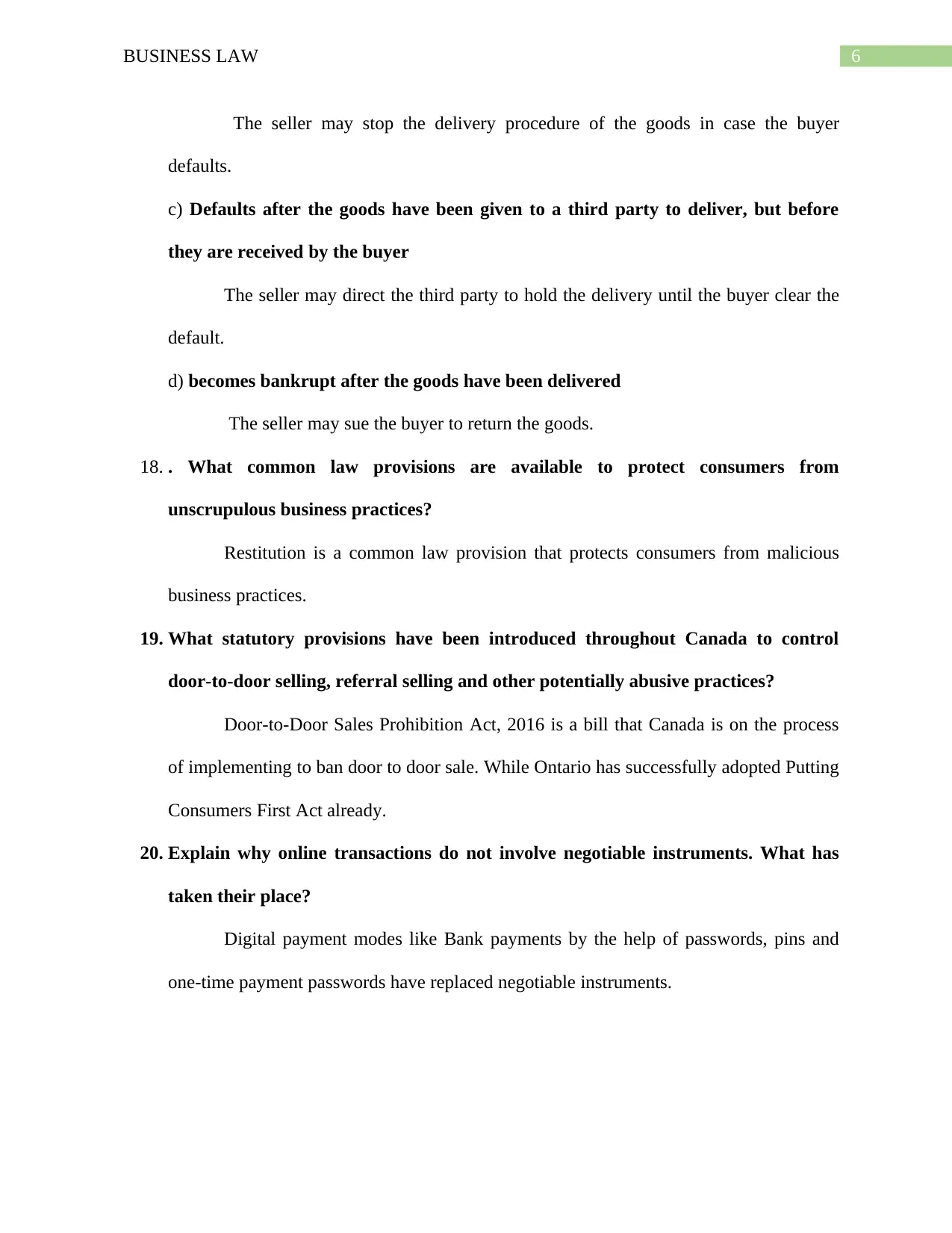
6BUSINESS LAW
The seller may stop the delivery procedure of the goods in case the buyer
defaults.
c) Defaults after the goods have been given to a third party to deliver, but before
they are received by the buyer
The seller may direct the third party to hold the delivery until the buyer clear the
default.
d) becomes bankrupt after the goods have been delivered
The seller may sue the buyer to return the goods.
18. . What common law provisions are available to protect consumers from
unscrupulous business practices?
Restitution is a common law provision that protects consumers from malicious
business practices.
19. What statutory provisions have been introduced throughout Canada to control
door-to-door selling, referral selling and other potentially abusive practices?
Door-to-Door Sales Prohibition Act, 2016 is a bill that Canada is on the process
of implementing to ban door to door sale. While Ontario has successfully adopted Putting
Consumers First Act already.
20. Explain why online transactions do not involve negotiable instruments. What has
taken their place?
Digital payment modes like Bank payments by the help of passwords, pins and
one-time payment passwords have replaced negotiable instruments.
The seller may stop the delivery procedure of the goods in case the buyer
defaults.
c) Defaults after the goods have been given to a third party to deliver, but before
they are received by the buyer
The seller may direct the third party to hold the delivery until the buyer clear the
default.
d) becomes bankrupt after the goods have been delivered
The seller may sue the buyer to return the goods.
18. . What common law provisions are available to protect consumers from
unscrupulous business practices?
Restitution is a common law provision that protects consumers from malicious
business practices.
19. What statutory provisions have been introduced throughout Canada to control
door-to-door selling, referral selling and other potentially abusive practices?
Door-to-Door Sales Prohibition Act, 2016 is a bill that Canada is on the process
of implementing to ban door to door sale. While Ontario has successfully adopted Putting
Consumers First Act already.
20. Explain why online transactions do not involve negotiable instruments. What has
taken their place?
Digital payment modes like Bank payments by the help of passwords, pins and
one-time payment passwords have replaced negotiable instruments.
Paraphrase This Document
Need a fresh take? Get an instant paraphrase of this document with our AI Paraphraser
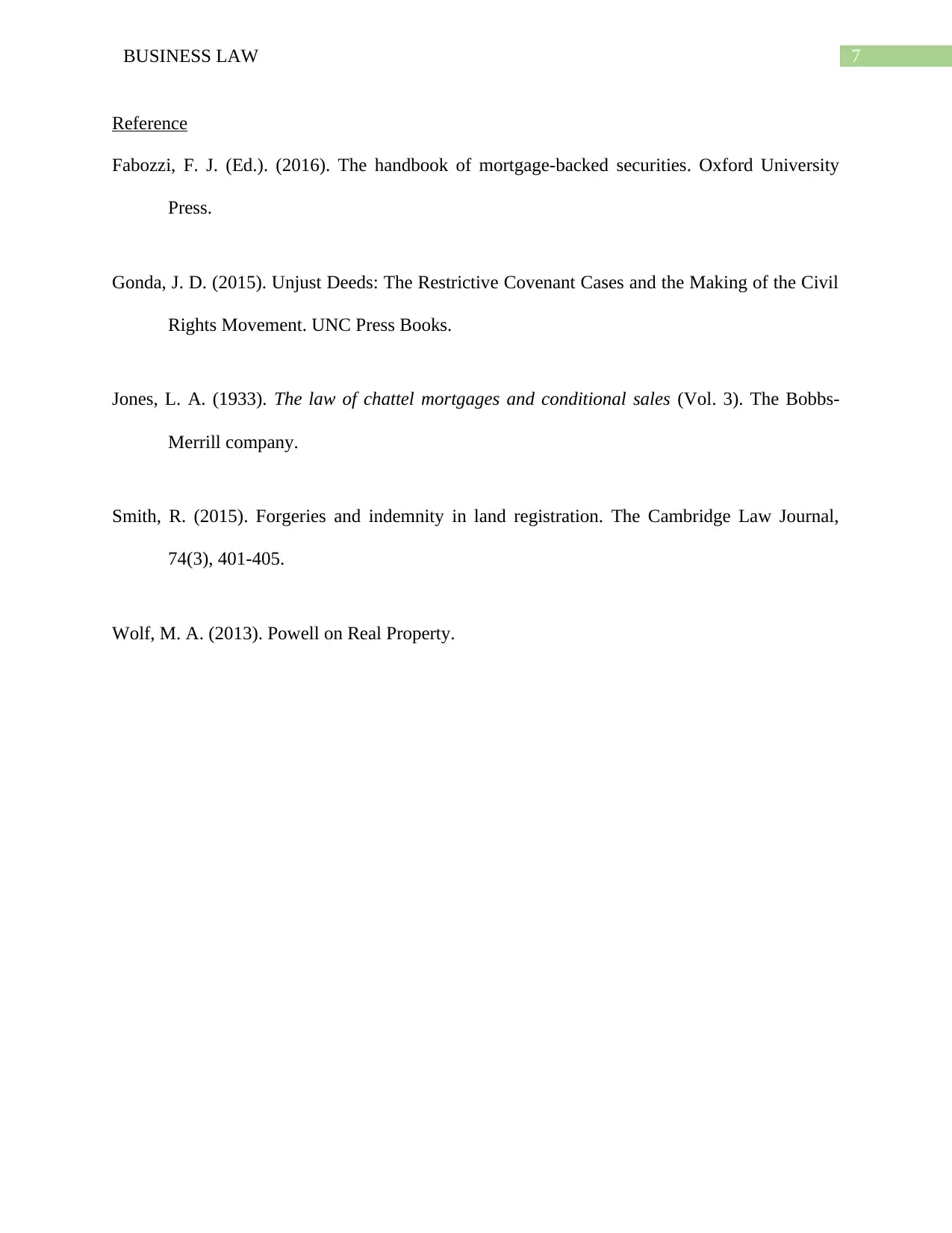
7BUSINESS LAW
Reference
Fabozzi, F. J. (Ed.). (2016). The handbook of mortgage-backed securities. Oxford University
Press.
Gonda, J. D. (2015). Unjust Deeds: The Restrictive Covenant Cases and the Making of the Civil
Rights Movement. UNC Press Books.
Jones, L. A. (1933). The law of chattel mortgages and conditional sales (Vol. 3). The Bobbs-
Merrill company.
Smith, R. (2015). Forgeries and indemnity in land registration. The Cambridge Law Journal,
74(3), 401-405.
Wolf, M. A. (2013). Powell on Real Property.
Reference
Fabozzi, F. J. (Ed.). (2016). The handbook of mortgage-backed securities. Oxford University
Press.
Gonda, J. D. (2015). Unjust Deeds: The Restrictive Covenant Cases and the Making of the Civil
Rights Movement. UNC Press Books.
Jones, L. A. (1933). The law of chattel mortgages and conditional sales (Vol. 3). The Bobbs-
Merrill company.
Smith, R. (2015). Forgeries and indemnity in land registration. The Cambridge Law Journal,
74(3), 401-405.
Wolf, M. A. (2013). Powell on Real Property.
1 out of 8
Related Documents
Your All-in-One AI-Powered Toolkit for Academic Success.
+13062052269
info@desklib.com
Available 24*7 on WhatsApp / Email
![[object Object]](/_next/static/media/star-bottom.7253800d.svg)
Unlock your academic potential
© 2024 | Zucol Services PVT LTD | All rights reserved.





